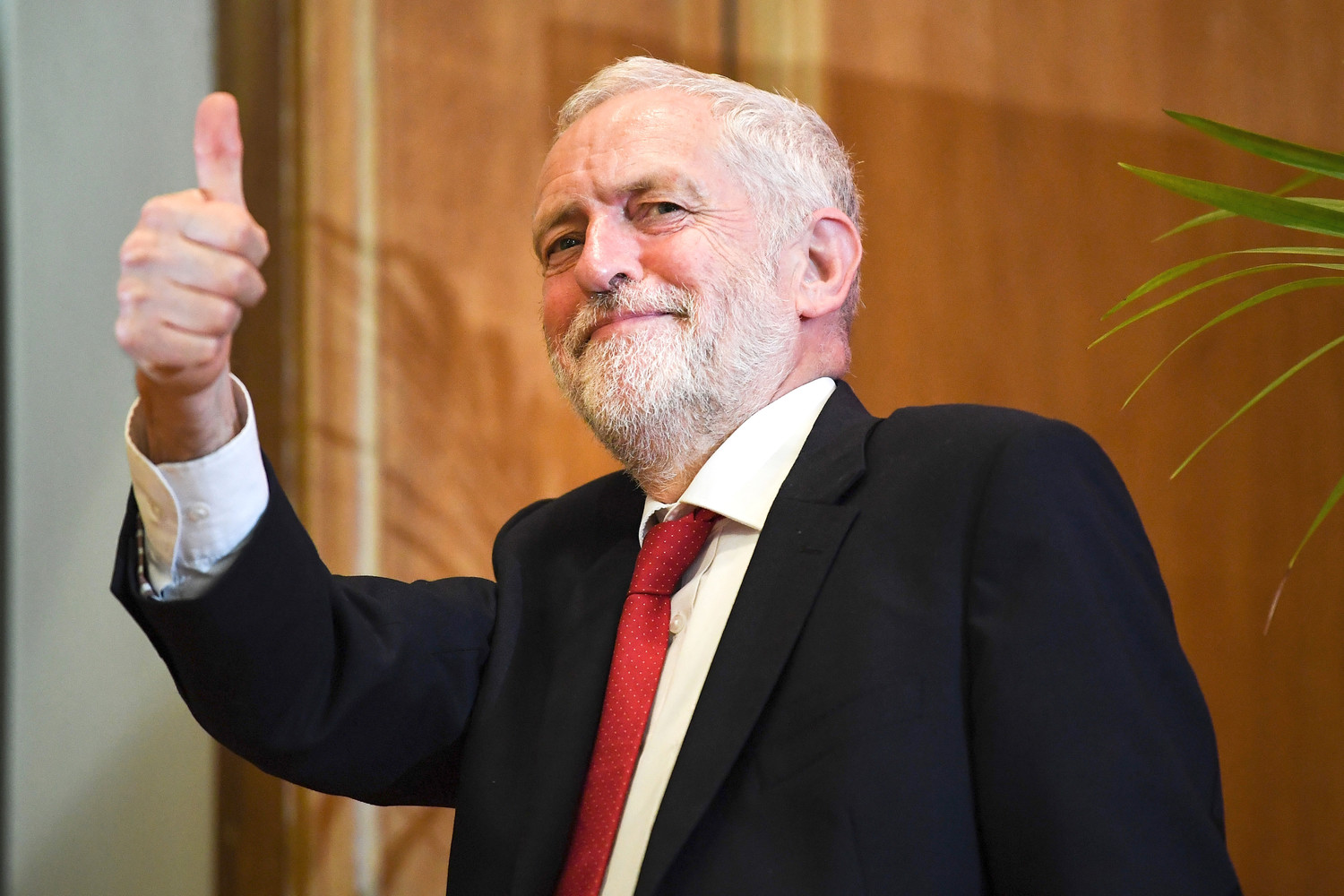British Labour Party defines anti-Semitism
It’s been nearly three years since Jeremy Corbyn became leader of Britain’s Labour Party, and he has riled British Jews more than any politician in recent history.
Last week, Great Britain’s three leading Jewish newspapers united to publish a front-page editorial warning that a Corbyn premiership would constitute an “existential threat to Jewish life in this country.” In May, the previous president of the Board of Deputies of British Jews said Corbyn has “anti-Semitic views” and that his rising popularity is making Jews question their future in the country.
This unprecedented rhetoric, accompanied by street protests, follows Corbyn’s alleged inaction against anti-Semitic speech within the party.
A hard-left politician who called Hezbollah and Hamas officials “friends,” Corbyn is widely accused of tolerating anti-Semitism disguised as anti-Zionism, among other forms of Jew hatred. Revelations such as his defense of an anti-Semitic mural and membership in anti-Semitic Facebook groups have done little to improve his image.
Ironically, though, the worst crisis yet is currently unfolding not over his party’s inaction, but over its attempt to address the problem: the adoption of a definition of anti-Semitism.
Critics call it a defanged version of the British government’s own definition. The government’s, based on a “working definition” by the International Holocaust Remembrance Alliance, outlines classic expressions of anti-Semitism and ways in which criticism of Israel can be perceived as anti-Semitic.
Labour’s suggests one could compare Israeli policy to Nazis’ and not be an anti-Semite.
Jennie Formby, Labour’s general secretary, said the document will “foster deeper understanding about all forms of anti-Semitism within our movement.” For example, she wrote, Labour’s definition includes certain words and tropes not included in the IHRA’s.
The debate over the quasi-legal document has deteriorated into a fight featuring expletives by lawmakers, racist conspiracy theories and growing despair even among supporters.
Critics’ main grievance is that Labour’s definition omits some Israel-related points. Labour does feature some examples of anti-Israel vitriol, including accusing Israel of exaggerating the Holocaust, but also states that Israel’s description of itself as “a ‘Jewish state’” can “cause particular difficulty in the context of deciding whether language or behavior is anti-Semitic.”
To David Hirsh, a Jewish University of London lecturer who last year published a book on left-wing anti-Semitism in Britain, the definition is a loophole, a way for Labour to articulate “opposition to anti-Semitism which would not define their friends” as anti-Semitic.
The Labour definition, he said, stipulates that offenders must have shown anti-Semitic “intent” in order to be disciplined. “And nobody on the left has anti-Semitic intent,” he said sarcastically.
The new definition follows decades of accusations involving a former mayor of London, Ken Livingstone, who quit Labour in May following repeated claims that Zionists collaborated with Hitler. In 1984, he said Jews were “basically a tribe of Arabs,” and that “the Jews became reactionaries, turned right, nearly to be fascists.”
Corbyn, whose party resisted calls to kick out Livingstone, said it was a “sad moment.”
Earlier this month, 68 British rabbis published an open letter condemning Labour’s divergence from the IHRA definition as “insulting and arrogant.” The Board of Deputies of British Jews has issued a similar call.
The row has prompted a spate of resignations, including lecturer and Palestinian rights advocate John Strawson, journalists Jane Merrick and Martin Bright, and lawmaker John Woodcock. Other moderates will resign in September.
Some critics have been less polite, among them Dame Margaret Hodge, a Jewish Labour lawmaker. During a July 17 meeting in Parliament, Hodge told Corbyn, “You’re a f---ing anti-Semite and a racist. You have proved you don’t want people like me in the party,” according to witnesses. Labour’s ethics board launched an internal investigation to discipline Hodge.
Some say the conflict has descended to violence: Paul Mason, a journalist and Corbyn supporter, is accused of assaulting a Dutch Jewish activist in the Hague who held up a banner reading “Labour, for the many not the Jew” during Corbyn’s speech.
Separately, Damien Enticott, a Labour representative in south London, admitted to sharing on Facebook a video accusing Jews of drinking blood. He has been suspended pending investigation, one of at least 250 cases of alleged anti-Semitism referred to Labour’s ethics panel.
Peter Willsman, a key Corbyn supporter, was recorded saying of Jewish critics, “I am not going to be lectured to by Trump fanatics.” To the 68 rabbis, he said, “Where is your evidence of severe and widespread anti-Semitism in this party?”
Corbyn, who was present when Willsman made the remarks, did not react, witnesses said.
Labour’s homemade anti-Semitism definition follows several failed attempts to appease critics.
In 2016, an internal review found that Labour has an “occasionally toxic atmosphere” against Jews, but no institutional problem. The Board of Deputies called the report a whitewash — especially after its author was promoted to represent Labour in the upper house of Parliament months after submitting it.
Corbyn’s attendance at an alternative Passover Seder dinner in April was also controversial; the group organizing the event, Jewdas, included a “Prayer Against the State of Israel” in its Haggadah that asks God to “smash” the Jewish state. It also included the “Ten Plagues of the Occupation of Palestine.”
“Either Jeremy Corbyn was deliberately provoking the Jewish community or making a catastrophic error of judgment,” Jonathan Arkush, then leader of the Board or Deputies of British Jews, said. “I don’t know which of these is true.”
Keith Kahn-Harris, a London sociologist, wrote that Labour’s definition “has only compounded the problem” it seeks to solve.
But he cannot ascertain whether it was a cynical attempt to give accused anti-Semites a loophole, or a genuine but botched attempt to address the problem.
“Maybe both things are true,” he said.

 47.0°,
Mostly Cloudy
47.0°,
Mostly Cloudy 




